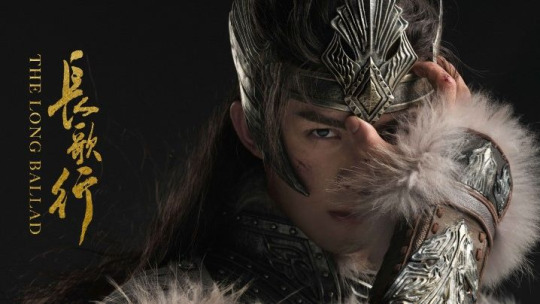#wei shuyu
Explore tagged Tumblr posts
Text





Hao Du, can't you see it with your eyes?
长歌行 The Long Ballad ep. 17 + 32
63 notes
·
View notes
Text












FANG YILUN (方逸伦) / ALEN FANG as Wei Shuyu
in The Long Ballad (长歌行), 2021
#fang yilun#fang yilun avatars#cdrama#the long ballad#wei shuyu#chang ge xing#alen fang#alen fang avatars#方逸伦#长歌行#chinese fc#period fc
24 notes
·
View notes
Text
The Long Ballad is an experience in watching The Nice Guy TM character slowly become more and more irredeemable as the show goes on while everyone else moves on with their lives and improve as human beings
#the long ballad#chang'ge xing#legit any time he would show up after a certain point triss and i just GROANED#wei shuyu#wei shuyu hating hours are all hours
15 notes
·
View notes
Text




removing masks
4 notes
·
View notes
Text

A Journey to Love 一念關山
Liú YûNíng 劉宇寧 and Fang YìLún 方逸倫 singing 奉上 (to make an offering) together! ❤❤❤
The whole livestream is FANTASTIC btw! With a bromantic walk by the lake and a visit to an aquarium.
#a journey to love#liu yuning#fang yilun#chinese actors#singing LYN#cdrama#and happy birthday LYN!!!!!!!#AJTL successfully switched my brain from#you shut it Wei ShuYu!#to#I'm ok! the snake is ok!#every time I see FYL#🤣🤣🤣#the bromance livestream!#LYN mentions Zeng ShùnXi and them singing together#Wang YiZhe joins them for a chat#an aquarium date!#xiao Fang knows how to plan an afternoon
48 notes
·
View notes
Text
Wait. Shit.

Shuyu said the same thing to Jin Feng!!!
"As long as it's what I wish, regardless of what I do, where I am, will you continue to support me?"
Jin Feng turned to look at me, smiling, "Probably most of the time. It'll be bad to go against my brother if he hasn't done anything wrong."
#what does this mean...#shuyu has a type?#we already established that#haha it'll be funny if wei xiao-ge turned out to reincarnate into jin feng#hahaha...#yeah no that's kind of a stretch#dominion's end#jin feng's answer *is* different from what wei xiao-ge promised
1 note
·
View note
Text
未定的注定 (Undecided Fate) --LYRICS RETRANSLATION + NOTES
A/N: finally, after all these years, I post something that isn't a shitpost. Was chatting with discord friends while playing ToT episode 9 and that one line by luke made me wanna translate this. Uhh, translation notes at the end. Have fun reading and geeking out with me. This is a personal translation of the lyrics of ToT's official theme song
曾是我 寄身在黑暗中 Ceng shi wo ji shen zai hei’an zhong I used to be stuck in the dark 走尽夜路也盼有灯属于我 zou jin ye lu ye pan you deng shuyu wo Walking the night path with a lamp/light of mine 是否等候我的窗将有微光涌动 shifou denghou wo de chuang jiang you wei guang yong dong Whether a (soft) light shimmers through my windows 绽放成你 温热在我手 zhanfang cheng ni wen re zai wo shou Gently blooms into you in my hands
你是未定的希望 ni shi weiding de xiwang You're the undetermined hope 却是注定的光芒 que shi zhuding de guangmang Yet the fated light 照引我的心 zhao yin wo de xin Light up my heart 到黑夜退去 dao heiye tuiqu Retreat into the night
愿我也能温暖你 yuan wo ye neng wennuan ni Hope that I can also warm you up 走向未定的真相 zouxiang weiding de zhenxiang Walking towards the undetermined truth 解除命运的捆绑 jiechu mingyun de kunbang Untie the restraints of life's path 无所畏惧和你相倚 wu suo weiju he ni xiang yi Fearlessly lean on eachother with you
在余生每个黎明 zai yusheng mei ge liming At dawn, for the rest of our lives 你是谜 封锁住我眼眸 ni shi mi fengsuo zhu wo yan mou You're the riddle that locked my eyes shut 你是意义占据我所思所有 ni shi yiyi zhanju wo suo si suoyou You're the reason occupying all my thoughts 你是未定的美好我开始猜不透 ni shi weiding di meihao wo kaishi cai bu tou You're the indetermined perfection that I can't figure out
现在我才懂 为何萦梦 xianzai wo cai dong weihe ying meng Only now have I realized why we dream 你是未定的希望 ni shi weiding de xiwang You're the undetermined hope 却是注定的光芒 que shi zhuding de guangmang Yet the fated light 照引我的心 zhao yin wo de xin Light up my heart
走向未定的真相 zouxiang weiding de zhenxiang Walking towards the undetermined truth 解除命运的捆绑 jiechu mingyun de kunbang Untie the restraints of life's path 无所畏惧和你相倚 wu suo weiju he ni xiang yi Fearlessly lean on eachother with you 在余生每个黎明 zai yusheng mei ge liming At dawn, for the rest of our lives
已注定 yi zhuding Already fated
你是未定的希望 ni shi weiding de xiwang You're the undetermined hope
却是注定的光芒 que shi zhuding de guangmang Yet the fated light 照引我的心 zhao yin wo de xin Light up my heart 到黑夜退去 dao heiye tuiqu Retreat into the night 愿我也能温暖你 yuan wo ye neng wen nuan ni Hope that I can also warm you up
走向未定的真相 zouxiang weiding de zhenxiang Walking towards the undetermined truth 解除命运的捆绑 jiechu mingyun de kunbang Untie the restraints of life's path 无所畏惧和你相倚 wu suo weiju he ni xiang yi Fearlessly lean on eachother with you 在余生每个黎明 zai yusheng mei ge liming At dawn, for the rest of our lives 已注定 yi zhuding Already fated
NOTES:
绽放 specifically means the opening of the flower petals when a flower blooms Also MC is very flower-coded (rosa) So i thought that was a nice detail
Now the "warming up" specifically means the type of comforting warmth that campfires or torches will give you on a cold dark night
解除 (untie) could possibly be a reference to how the NXX investigation gets more and more complicated, with an overwhelming amount of cases practically "tangled up" in eachother, so you're slowly picking it apart one by one with the team (aka your soulmates)
Also I specifically used "lifes path" for 命运 because that phrase is only used to talk about the course of a persons life, aka the events/path that life has laid down for you (your canon events, if you will)
意义 means like, the significance, meaning or reason/motivation behind someone's actions, but idk how to translate that
黎明 was hard to translate, cause it can mean both dawn and dusk, or any time of day (altho dawn and dusk are the most used, hehe crepusculum and diluculum) but it basically mean that the two relies on eachother every single day for the rest of their lives
A/N: That's it! Hope this was comprehensible to read
#nacho blahs#Tears of themis#tears of themis theory#tears of themis analysis#tot#tot theory#tot analysis#tot luke#tot artem#tot vyn#tot marius#xia yan#lu jinghe#zuo ran#mo yi#luke pearce#marius von hagen#vyn richter#artem wing#rosa#Spotify
25 notes
·
View notes
Note
I appreciate your reviews but I'm curious how you rated the long ballad higher than sword snow stride? The writing isn't even close to being on the same level, and the quality of each character in the show is in another ballpark. Only 2 characters are interesting in the long ballad vs every character being interesting and portrayed well in Sss. That being said great reviews and I've enjoyed watching most of the shows you recommend.
Hmm.. have you watched any wuxia dramas or read any wuxia novels in the past? Sword Snow Stride belongs to the wuxia genre, and as far as wuxia dramas go, this one was not particularly well-written. The world-building is a bit sloppy and doesn't do a great job of establishing limitations and stakes. Almost all wuxia stories have big casts of eclectic characters so I don't view this as being super impressive, especially when it follows very familiar character tropes.
For me, the biggest problem was the lack of pacing and direction in the story, i.e. it's a bit boring. I know a lot of people who started watching SSS and almost everyone gave up halfway through because they found it boring. I pushed through to the end because Zhang Ruoyun is one of my favourite actors so I have a lot of patience for his work. I did enjoy it in the end, but I could see why other people found this drama disappointing.
Another genre-specific problem? The fight scenes were bad. This drama literally went viral for having bad fight scenes. Fight scenes don't necessarily make or break a drama, but they're pretty important when the genre is literally about the martial arts world.
Meanwhile, I thought the writing in TLB was excellent. TLB focuses narrowly on one particular character's heroic journey and growth, and it does an excellent job of that. Whether you found the other characters interesting is obviously subjective, but I really liked supporting characters like Mimi Guli and She'er and (controversially) Wei Shuyu. As a fun bonus, the fight scenes are actually among the best I've seen in recent years (though this is not a wuxia drama lol).
I think I simply don't rate SSS as highly as you do, and I think you might be mistaking genre conventions for writing quality. If you like wuxia genre conventions and tropes (I love them! that's why the genre is in my blog title!), I would highly encourage you to try some better wuxia dramas. Happy to give recommendations if you're interested!
0 notes
Text
Looking up times and distances for fantasy stories based in real world settings is... something. I was just looking at stuff for possible Long Ballad fic and Yunzhou, where Leyan was working at the weaving shop, is nearly 400 miles from Luoyang.
I will never make fun of Wei Shuyu and Hao Du for not finding her because her ending up in Yunzhou is improbable at best to begin with, and that's a lot of area to cover.
Also Leyan and Xiao Wu were walking at least a MONTH.
0 notes
Photo










local emotionally constipated man with daddy issues experiences several emotions in a row, is unhappy about it, more at 11
118 notes
·
View notes
Photo






Who said I came alone? Don't say I didn't warn you. If you dare make any more sudden moves, who knows whose head will be shot next! The Long Ballad • episode 48
#cdramaedit#asiandramanet#the long ballad#chang ge xing#dilraba dilmurat#wu lei#liu haikuan#kudousi jiang ainiwaer#fang yilun#liu minjia#wu chenxu#li changge#ashile sun#situ langlang#ashile she'er#wei shuyu#luo shiba#xu feng#*mine#*mygifs#*cgx#i watched cgx for its Plot#the Plot: [gestures at this post]
333 notes
·
View notes
Text
The Long Ballad - thoughts
Just finished The Long Ballad and I have to say, I enjoyed it. Primarily because I went in with 0 expectations. After the brutal and fascinating journey that was Nirvana in Fire, I wanted something that did not require much thought and was enjoyable. And The Long Ballad delivered. I primarily went in for Liu Haikuan, knowing that he is a bit role, and I wasn't disappointed. I will discuss the details of the show below and because there are some spoilers, I will keep it under "keep reading"

PLOT: After the brutal death of her family, Li Changge (Dilraba Dilmurat) goes on a self-imposed exile. The story is about her journey. She goes from an angry, revenge-seeking princess to a woman who comes to see the bigger picture and finds inner peace and true love. This is also the story of Ashile Sun (Wu Lei), the battle-hardened war veteran who slowly comes to realize the futility of war and understand where true happiness lies. This is the journey of Leyan (Zhao Lusi), the soft, sheltered, shy princess who finds her own form of courage and strength. We also witness Hao Du (Liu Yuning), the cold-blooded, by-the-books soldier who falls head-over-heels in love with Leyan. There is also Wei Shu Yu (Alen Fang) who goes from being a useless waste of space to brotherzoning himself. (He does it all on his own. No one places him there.)
The series is adapted from the manhua "Chang Ge Xing" (长歌行) written by Xia Da (夏达). The manhua, apparently, got embroiled in some legal issues with its publishing company and is hence left incomplete. The team of Long Ballad got the writers, Chang Jiang and Pei Yu Fei on board and the duo did a commendable job in making changes in the characters and the story to deliver a complete package to the audiences.
The plot, while complex and layered, is also very sanitized. They touch upon fairly dark topics such as fratricide, human trafficking, slavery, biological warfare, and rape, but the topics are treated with kid-gloves. The rape, for example, is never shown. Only implied. This is a very important detail to remember while watching the show. Do not go in expecting a "Nirvana in Fire" or even "The Rebel Princess", you will be disappointed. Go in expecting a Young Adult story, and you will be rewarded.

CHARACTERS AND PERFORMANCES:
Li Changge: The protagonist of the story, Li Changge, starts as a boisterous, confident, but naive Princess. This is primarily her story, told mainly through her point of view. She goes from town to town, actively taking part in the governing of the cities/states. Fighting in wars, strategizing, making mistakes and learning from them. Finding both love and inner peace in the process. As you may have gleaned, the character is a bit of a Mary Sue, in the sense that she is almost perennially outsmarting everyone around her and people are constantly complimenting her on her smarts. That said, Changge does end up making a huge mistake and there are some serious consequences to her mistake, which decreases her Mary Sue-ness. The fact that not every man is falling for her like some other Mary Sues we know, coughA'Wucough, is also a HUGE positive. Dilraba Dilmurat does a commendable job as Li Changge and I don't really have anything negative to say about her performance.

Ashile Sun: He is the Tegin (General) of the Eagle Division of the Ashile Tribe and the foster son of the Great Khan of the Tribe. He is a fierce warrior and a quiet man whose perfectly ordered world is turned upside down upon meeting Li Changge. He is the hero of the story and is a character I enjoyed. Given his age, people did have some concern about Wu Lei portraying such a "masculine" character, but Wu Lei rose to the occasion spectacularly. I could discard Fei Liu (not an easy task, because damnit, I could still see the little murder puppy in some angles because the face is still the same, yet different), and see Ashile Sun instead, so full points to Wu Lei.

Li Leyan: Leyan starts as the soft and delicate princess who cannot stand up for herself. Her story is so beautifully shown. The way she comes to understand her country, her people, and learn true compassion is so beautifully shown that it really melted my heart. I loved the bits where she came in and Zhao Lusi embodied the character perfectly. Her love story was arguably the best thing in the story.

Hao Du: Meet the guy that stole the show. The stoic, cold-blooded, brutal warrior who is absolutely smitten with Li Leyan, the princess he is supposed to guard. Hao Du is a man of few words and Liu Yuning portrays the complex emotions with his expressions. He conveyed the cold and unfeeling mask, the pure love, the devotion, the heartbreak, and the complete surrender to Li Leyan - he showed it all. It was just... FABULOUS.

Wei Shu Yu: Meet the Ma Zitan of this story. Only, unlike Zitan who is both terrible and useless, Wei Shu Yu is just terribly useless. Alan Fang was reasonably good in portraying this nothing character. There is nothing else to say about him.

Ashile She Er: I have to talk about this character. He starts off as the rival to Ashile Sun, the petty guy who is there to make the hero look good. But slowly, we learn that deep inside, he is just a hurt and confused child who is looking for one person who would love and trust him for who he is. Not for his name, not for his title (Young Khan, ie, crown prince), or the power he wields. His relationship with Ashile Sun is the most complicated one of the story and he gets a beautiful character arc. Kudousi Jiang Ainiwaer portrayed the progression of the character convincingly.

The rest of the cast is adequate.
TECHNICAL DETAILS
OST: The OST is beautiful and is definitely worth a listen. My favorite track is the one sung by Liu Yuning. Man, the guy can sing!
Costumes: The costumes are not the best I have seen (NIF and JOL have spoiled me in that department), but they were not bad either. The fur on Ashile Sun's war costume, especially the one around his neck, made me want to itch my own neck, lol.
Cinematography: The long shots are done well, but the camera does switch angles a bit too often sometimes, which was rather distracting.
Graphics: Since the story is taken from a manhua, there are some scenes, especially the war scenes, that are shown in manhua panels. While this works, mostly, there are scenes where they become a tad comical. There are moments in the series where the graphics are in the background and a character is yelling some dialogue. NONE of those scenes worked. They were cringeworthy. Question to the writers: What do you have against boys aged eight to fourteen? Why did you do this to them?
OVERALL
Overall, I enjoyed the series. Was it the best I have ever seen? No. Definitely not. But this was not the worst either. The series is complete and does not leave any thread hanging or plot point unaddressed. The acting is adequate and I don't have any complains in that department. Yes, it was rather simplistic in its solutions and Changge does get some things done way too easily. The sanitizing of the more serious aspects can be off putting to the viewers expecting a dark, gritty tale. Go in with the expectation of watching a YA story, and you will be treated to an enjoyable one.
Final rating: 7 out of 10.

#The Long Ballad#review#Li Chengge#dilraba dilmurat#ashile sun#Wu lei#li leyan#zhao lusi#hao du#liu yuning#wei shuyu#Alan fang#Ashile she er#kudousi jiang ainiwaer
53 notes
·
View notes
Photo




Wei Shuyu's appreciation post, because he deserves better
In the first half of The Long Ballad, Wei Shuyu's existence is completely a waste of screen time to me. He was the golden boy of Chang'an, but that's before Xuanwu Gate Incident. He clearly wasn't just Changge's childhood friend, or brotherlike. He had a crush on her and was stuck between wanting to help her and protecting his family. His ideal righteous and bravery now become such a heavy burden, he obviously didn't know what to do. But what could Wei Shuyu do about Changge and the power shifting? Even his father was down during that period. When I first watched the drama, it was so tiring watching him whining, blaming other people, taking responsible and talking big without actually making any difference. But gradually, he becomes one of my favourites for his growth. Despite being listed as one of the five main characters, Wei Shuyu is clearly being used as a background for the other four. For some reason he is underrated more than many other supporting characters like She'er, A'Dou, Mimi Guli or Mu Jin. And don't get me wrong, all of them are my favs too, but don't you think it's unfair for him? I love how most of the characters in this drama has their background stories or being really well-developed. Except for Wei Shuyu. His growing process is off-screen, and while some others are being a little bit over-exaggerated, his achievements are being underestimated. Take a look at the gifs above, my top 4 moments of him. ① Being Datang's envoy, representing his country, he is the main responsible person for the meeting with the desert's tribes about forming alliance. And he firmly faced Khatun of Ashile Tribe, getting all what his emperor had ordered. The old Wei Shuyu could never do that. ② He was the only one trying to understand the crown prince. Everyone sees the prince as a little spoiled brat (including me), but Wei Shuyu, with the same patience & gentleness for Changge, was able to reason with him. ③ He was leading one of the two groups sneaking in to rescue those being captured by Yi Cheng. Then he escorted Empress Xiao & her grandson back to Chang'an. He was weaker than Hao Du, but that's before. Now he's strong enough to be assigned for such important mission. ④ Lastly, he was able to let go of his crush for Changge and sincerely wishes her happiness with A'Sun. Of course not only for her, he wishes happiness for everyone.
In the end, he was able to stay true to his ideal righteous & bravery while still maintaining the gentleness, the kind-hearted part. So, doesn't all that prove he really deserves more appreciation?
28 notes
·
View notes
Photo

13 notes
·
View notes
Text



Fang YìLún 方逸倫
A Journey to Love 一念關山
Airing on November 28, 2023
#fang yilun#a journey to love#一念关山#cdrama#chinese actors#I'm happy to see him working with LYN again after#the long ballad#tw: flashing video#hopefully it will convince my brain-gremlin to stop yelling#just shut up wei shuyu#every time I see FYL's face
8 notes
·
View notes
Text


She asked softly, "Do you love Xiao Jun?"
Wei Mingyun was silent for a moment, then exhaled roughly. He said quietly, "Love or not, is it that important? The people I did my best to protect turned around to rob me, all because they feared I'd retaliate... Those who passed by me ignored my calls for help."
"Only Xiao Jun stopped to ask about my wounds, she told me she'd bring me away."
"I then swore that, if I ever survived, this life I owed would be used to protect her, I had to keep her safe, I had to..."

"Xiao Jun was just too upright, never once thinking of doing the same after her boyfriend cheated on her. And you were too stupid, calling Xiao Jun 'jie' even though you're just seven years younger. You don't even know how to steal her away."
(holy shit he's 7 years younger, Shuyu is 7 years younger than Jin Feng)
(also it was very satisfying to see Xiao Qi kill XZG)

XZG: Xiao Qi, quick, heal me. There are aberrants everywhere, who'll protect you if I die? They'll bite you piece by piece!
"The person I can rely on has already been killed by you."
1 note
·
View note